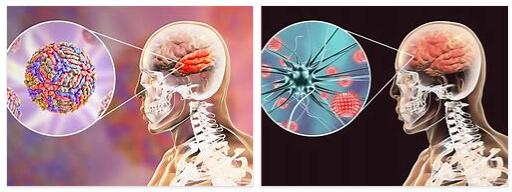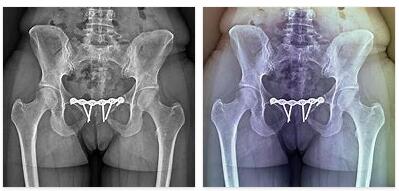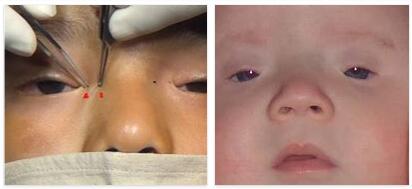In a brain inflammation or encephalitis the brain inflamed due to bacteria, viruses, fungi or other pathogens. Depending on the cause and severity, symptoms of paralysis, loss of consciousness and hallucinations can occur. In most cases, rapid intensive care treatment for encephalitis is necessary.
What is encephalitis?
The name encephalitis is made up of the ancient Greek word for brain and the ending -itis, which stands for inflammatory diseases. So it is an inflammation of the brain and this often has serious consequences.
Depending on the degree of inflammation, the symptoms range from headache, fatigue and tiredness to visual or speech disorders, paralysis, hallucinations, convulsions and loss of consciousness. Neck stiffness, disorientation, fever and nausea can also occur. The spinal cord or meninges can also be affected by the inflammation.
Patients with encephalitis usually feel very ill and need (intensive) medical treatment as soon as possible! The best-known encephalitis is tick-borne tick-borne meningoencephalitis (TBE), but there are many other forms of encephalitis.
Causes
Most of the time, encephalitis is caused by viruses. For example, flu, mumps, measles, rubella, rabies and herpes viruses can cause brain infections. Also ticks transmit viruses that can cause encephalitis. This form is called early summer meningoencephalitis (TBE).
But other pathogens can also trigger inflammation in the brain: bacteria (for example those from typhus, syphilis, listeriosis and borreliosis), fungi and, in rare cases, parasites (for example worms).
And finally, processes in an autoimmune disease or multiple sclerosis can also trigger encephalitis. People with impaired or weakened immune systems are particularly at risk, and infants and the elderly are often affected by encephalitis.
Symptoms, ailments & signs
The symptoms of encephalitis depend on which region of the brain is affected. In many cases the disease heals completely. However, deaths or chronic courses with long-term neurological deficits are also possible. In the case of a viral infection, the disease begins with unspecific symptoms that can also occur with other diseases.
These include fever, headache, muscle pain, fatigue and nausea. Then the symptoms that are specific to encephalitis appear. This suddenly leads to disturbances of consciousness and states of confusion. Concentration and memory are severely impaired.
Changes in behavior that manifest themselves in constant mood swings, delusions, hallucinations and disorientation are particularly noticeable. Vomiting is also common. At the same time, there are neurological deficits such as speech disorders and symptoms of paralysis in the arms, legs or eye muscles. Seizures are sometimes observed.
If the meninges are involved, neck or back stiffness also occurs. Persistent seizures (status epilepticus) or cerebral edema are observed as complications. Cerebral edema also leads to dizziness, constant headaches, as well as nausea and vomiting.
Depending on the location of the edema, disturbances of consciousness up to coma, visual disturbances, breathing difficulties, slowing of all movements or constant hiccups are possible. Since both complications are potentially life-threatening, intensive emergency medical assistance is required if these symptoms occur.
Diagnosis & course
Since the symptoms of encephalitis are quite typical, a doctor usually has a suspicion after describing the symptoms and refers the patient to the clinic. There other diseases have to be ruled out and the suspicion confirmed.
A blood test gives the first clues about inflammatory processes and defense reactions in the body. An examination of the cerebral water (liquor puncture) gives more precise information about the type of encephalitis. The attending physician can use magnetic resonance imaging or computed tomography to rule out tumors or cerebral haemorrhages. He also detects swelling of the brain, which almost always occurs in connection with encephalitis.
Despite rapid medical treatment, the course of encephalitis is sometimes tragic: with some types of bacterial encephalitis, patient mortality is 50%. In other species, for example TBE, 2% of those affected die. Apart from that, serious complications are possible. In the worst case, encephalitis can leave behind intellectual disabilities, paralysis, or seizures.
Complications
The encephalitis can lead to serious complications and in the worst case to death. As a rule, areas of the brain are irreversibly damaged, leading to paralysis or hallucinations. As the disease progresses, the person may also lose consciousness or fall into a coma. Life expectancy is drastically reduced with untreated encephalitis.
There is also a severe headache and fever. The patient suffers from a general feeling of weakness. Concentration and coordination are also weakened, and disorders of consciousness or orientation disorders often occur. The patient’s quality of life is extremely reduced and normal everyday life is usually no longer possible.
Diagnosing encephalitis is relatively easy, so treatment can start early. Antibiotics are administered, which in most cases lead to a positive course of the disease. Complications arise when the encephalitis has not been treated for a long period of time and irreversible damage to the brain has occurred. Paralysis may persist or the patient may fall into a coma. In most cases, a longer stay in hospital is necessary.
When should you go to the doctor?
People who complain of a sudden decrease in performance should consult a doctor. If you have a headache, a feeling of pressure inside the head or a general feeling of pain in the body, a doctor should be consulted. The same applies to fever, dizziness or nausea.
If vomiting, nausea or digestive disorders occur, medical advice should also be sought. If malfunctions set in, a doctor must be consulted. Problems with sight, hearing or taste are considered unusual and should be discussed with a doctor. If the symptoms persist for several days or if they intensify, a doctor is required.
In the event of general malaise, internal weakness, exhaustion or restlessness, a doctor should be visited. If there is a disturbance of consciousness or if there is a loss of perception, an emergency doctor is required. Until it arrives, first aid measures are required. A life threatening condition exists that requires immediate action.
Mood swings or problems with orientation require an examination. A doctor should be consulted in the event of cramps, paralysis or problems with the muscular system. If there are noticeable changes in behavior, a general feeling of illness or psychological abnormalities, a doctor’s visit is required to clarify the cause.
Treatment & Therapy
Treatment of encephalitis depends heavily on the pathogen that caused the disease. In bacterial encephalitis, antibiotics are used to stop the bacteria from spreading and kill them. There are also drugs that kill fungi, so-called antimycotics.
In the case of viruses, only partially targeted drugs can be used. For many types of viruses, kills do not yet exist. In addition to tackling the root causes, the symptoms of encephalitis need to be treated. Pain is alleviated, fever lowered and the circulation stabilized as far as possible.
Cortisone is often used to treat brain swelling. If a patient is unconscious and / or breathing and circulation are severely impaired, artificial respiration must be given. If the cause of the encephalitis cannot be identified or if the virus is against which there are no effective drugs, often only the symptoms can be treated.
Treatment is given in the hospital because paralysis, cramps and other symptoms need to be responded to quickly. Intensive medical treatment and a hospital stay of several weeks are often necessary. The sooner the diagnosis is made and therapy begins, the greater the chances of defeating encephalitis.
Outlook & forecast
The prognosis for people with encephalitis varies depending on the age of the person affected. Small children and the elderly are considered to be particularly at risk. Depending on the type of virus that causes the disease and the extent of the affected brain areas, the disease tends to be pregnant.
While many people make full recovery, in severe cases the disease can be fatal or cause permanent brain damage. The result also depends on how quickly the treatment is done. In most cases, people with very mild encephalitis or meningitis can experience full recovery, although the process can be slow.
Patients who only have a headache, fever, and rigid neck can recover in 2-4 weeks. With bacterial meningitis, sufferers usually feel relief 48-72 hours after the first treatment. However, complications from the disease are more likely.
In particularly serious cases, this form of the disease can lead to hearing and / or speech loss, blindness, permanent brain and nerve damage, behavioral changes, cognitive disabilities, lack of muscle control, seizures and memory loss. Those patients may need long-term therapy, medication, and supportive care.
Prevention
There are effective vaccinations against some pathogens that cause encephalitis. The vaccination against measles, mumps and rubella, for example, is usually carried out on young children. You can also get vaccinated against TBE. You can protect yourself against Lyme disease by avoiding tick bites as much as possible with long clothing and repellants. Some pathogens, such as syphilis, are sexually transmitted. This is where condoms protect.
Aftercare
Follow-up care for encephalitis should be observed under all circumstances. If the person concerned is already receiving medical treatment, the doctor’s instructions should be strictly followed. It is important for the patient to rest with such inflammation. No physical exertion should be made. The intake of medication should also be observed at all times.
The strong pain reliever cortisone is often prescribed, and should continue to be taken even after symptoms have been relieved. Immunoglobulins are used to filter the antibodies out of the person’s blood. This medication can be administered for days.
In addition, the formation of new antibodies should be avoided or prevented as far as possible during follow-up care for an encephalitis. This is possible by strengthening and hardening the immune system. This kind of hardening of the immune system is done through a mild chemotherapy that the person to be treated should go through.
Each patient expresses different symptoms of encephalitis and is therefore treated individually. Follow-up care should also be adjusted accordingly. Even if the symptoms no longer appear too strong, rest and further drug treatment should be observed. If these guidelines are observed, perfect follow-up care is guaranteed in the case.
You can do that yourself
Encephalitis is a serious condition that should by no means be treated by yourself. If encephalitis is suspected, a doctor must be consulted immediately. In the early stages, encephalitis can be mistaken for the onset of a cold. Typical signs are fever, nausea and fatigue.
Often there are other symptoms such as stiff neck, confusion, paralysis and cramps, and loss of consciousness. Anyone who notices such symptoms should not experiment with over-the-counter drugs, but go to the nearest hospital immediately.
The best known is tick-borne meningoencephalitis in early summer. Specific self-help measures are possible against this form of encephalitis. On the one hand, tick bites should be avoided, especially in risk areas. It is best to take some precautionary measures for this. Insect repellants can deter ticks.
Wearing long pants and long-sleeved tops makes it more difficult for the insects to bite into. After returning from outside, your own body and any pets should be checked for ticks. There is a vaccination against the disease, which is especially recommended for people who are regularly in risk areas.
A strong immune system can help ensure that encephalitis does not break out in the first place, heals faster or is milder. The body’s own defenses are best strengthened by a healthy lifestyle, in particular a largely plant-based, vitamin-rich diet as well as by getting enough sleep and avoiding stimulants such as tobacco or alcohol.



